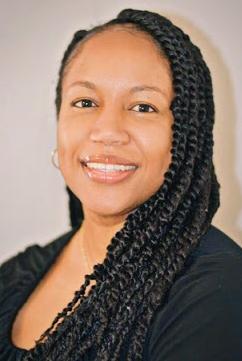Lauren Cain-Baxter ’17M Provides Telehealth Counseling, Advice for Self-Care

Cain-Baxter spent 10 years as an educator in the School District of Philadelphia before pursuing a career as a licensed professional counselor and behavior specialist. While identifying the psychological needs of middle school students, she decided to transition from teaching to counseling. As a graduate student at Arcadia, she participated in research opportunities and explored applied behavior analysis, eventually becoming a practicum supervisor within two years of graduation.
Arcadia faculty encouraged the rising clinician to start a private practice, Resilience Community Counseling, which opened its doors in 2018. The Elkins Park-based office provides treatment for mental health challenges. Cain-Baxter and her team of clinicians offer a neutral ground for individuals and families to heal and foster resilience in the face of adversity. Telehealth appointments and sessions conducted through online conferencing are important for many clients in need of accommodating therapy options. “The majority of our clients are women, and many of them are women of color who are working mothers and college students, so telehealth lends itself to flexibility,” explained Cain-Baxter.
The COVID-19 health crisis has created urgency in providing telemedicine, particularly for stress and anxiety, during government-issued social distancing and stay-at-home orders. Cain-Baxter, like her mental health care colleagues, offers counseling and recommendations for their clients who are struggling with maintaining work-life balance and gaining control over fears stemming from self-isolation. To address these challenges, Cain-Baxter has created a multi-faceted approach for mental health and well-being.
Work-life balance
“It all comes back to understanding, establishing, and maintaining boundaries,” Cain-Baxter said. “A lot of the work-life balance depends on whether you’re a segmentor or an integrator.”
While segmentors create rigid boundaries between their personal and work lives, integrators blur the lines between work and home, often switching back and forth between the two. When this happens, it’s difficult to decipher where work-life ends and personal-life begins.
Cain-Baxter advises clients to provide a cue, such as a white noise machine, which may minimize interruptions from household members during the workday. Creating a checklist of priorities each day helps manage time, as does a regular schedule for sleeping, eating, and taking physical breaks.
Elements of self-care
Many people think of self-care as an indulgence or a consumable product. Clinicians regard self-care as an essential part of well-being and good health.
“It involves multiple aspects of being: physical, emotional, social, spiritual, and professional self-care,” Cain-Baxter explained. “I recommend taking a self-care assessment to gauge needs and make sure someone is taking daily care of themselves in the ways they need.
Although some self-care activities are part of usual routines, there may be areas that require more attention. Recognizing individual needs, from spending time with loved ones to gaining new professional skills, is the first step to beginning a comprehensive self-care routine.
Stress relief and mindfulness
Cain-Baxter has seen an increase in clients who started to experience panic attacks for the first time in their lives. The onset is usually sudden and occurs at any time and place, often outside of someone’s comfort zone.
“My go-to exercise is diaphragmatic breathing,” she said. “Taking some time out of your day to practice, especially when you’re not stressed, is best. There are many apps and YouTube videos to guide deep breathing. This type of breathing slows the heartbeat and can lower or stabilize blood pressure.”
The benefits of diaphragmatic breathing include a trade of incoming oxygen for outgoing carbon dioxide. It can but also lead to greater mindfulness—a therapeutic technique related to calming awareness in the present moment. Cain-Baxter recommends breathing exercises several times a day for progressive muscle relaxation.
Eat, sleep, and be fit
When establishing schedules, Cain-Baxter suggests three things: eat regular meals, get enough sleep, and take time to exercise. With so many disruptions, it’s easy to skip meals and make poor dietary choices. Rather than snack throughout the day, schedule meals—with interactive prep time—as much as possible. In addition to proper nutrition, getting enough sleep affects mood; not getting enough can become more taxing physically and psychologically.
As people practice social distancing, adding exercise to daily routines has become more creative. While traditional walks on Kelly Drive are not feasible at the moment, Cain-Baxter recommends taking 10-minute walks around the neighborhood. With gyms off-limits, design an exercise program from online resources or use household items like water bottles as weights.
Fitness is a family enterprise for Cain-Baxter. Her husband, Don Baxter, is president of Health Fitness Connection, a fitness and wellness company that provides nutrition and wellness services to businesses and individuals. Since 2015, Health Fitness Connection has partnered with Arcadia to deliver annual weight loss, fitness, and wellness challenges, as well as online nutrition counseling, demonstrations, and seminars to more than 150 University employees. The company regularly offers online programs, which makes fitness programming more accessible for users from home.
Along with making adjustments to stay well, Cain-Baxter recommends looking for new opportunities rather than dwelling on the negative.
“We lament the things that we’ve lost, but we’re not taking into account some of the positive things that we’ve gained,” she said. “The challenge is to maintain the positive things that we found and adjust again when we return to normal. We have to stay flexible.”


